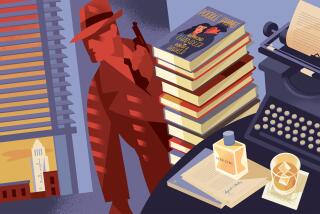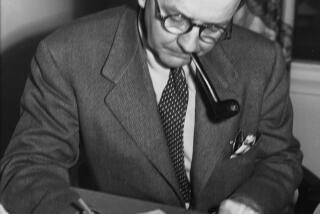From the pen of a poet, impressions of literary life
- Share via
TO read this rich, illuminating collection of correspondence from one of the greatest American poets is to be reminded of a time when writers of verse weren’t shunted away from society but were actively engaged in it. Not so much “the unacknowledged legislators of the world,” as Percy Bysshe Shelley famously proclaimed, but acknowledged public figures. The great American poetic voices of the post-World War II years -- a group that included Lowell, Adrienne Rich, John Berryman, Randall Jarrell and Elizabeth Bishop -- were published in mainstream magazines, invited to fulminate about world affairs on large stages, served Darjeeling and scones by first ladies. Imagine, if you will, Marianne Moore gracing the cover of Esquire along with the likes of Joe Louis and Jimmy Durante in 1966. To paraphrase Lou Reed, those were different times.
Robert Lowell was no exception. Although he paid his bills with a series of teaching and lecturing jobs throughout his life, he was no academic shut-in. Lowell was jailed for five months for being a conscientious objector during World War II and protested against Vietnam in the ‘60s. (He figures prominently in Norman Mailer’s chronicle of the 1967 march on the Pentagon, “The Armies of the Night.”) Had Lowell, who died in 1977 at age 60, been too snugly ensconced in the ivory tower, this hefty book wouldn’t have its crackle and verve, its moral indignation and freewheeling gallantry. This was a man of outsize appetites -- for literature, women, travel, booze -- and there’s a sense of restless aplomb in these letters, an urge to move off dead center before the rot sets in.
That voraciousness can be found in Lowell’s poetry, a versatile and emotionally resonant body of work that netted the writer a pair of Pulitzer Prizes. Moving fluidly from a technically rigorous high style to confessional free verse, Lowell tracked the atavistic impulses of the American spirit in war and love, railed against the cosseted Puritanism of his ancestry and caught the lyrical motes of everyday life with a command his peers could only envy.
Reading this book from front to back (which is a pleasurable experience, a rarity among epistolary surveys) reveals the source code, if you will, of Lowell’s art: the waxing and waning of his romantic entanglements, his struggles with manic-depressive illness, his thoughts on Hitler, Vietnam, Kennedy, Nixon, writing, Europe, Marxism, New York, his contemporaries. In short, there was very little that escaped Lowell’s purview.
Lowell was a perspicacious tracker of his own development as both an artist and a self-reliant individual. It’s fascinating to watch the progress of a poised young man, born into a notable Massachusetts family (his mother traced her lineage back to the Mayflower Winslows, while his father’s ancestors were among the first families to migrate to Massachusetts from Scotland), trying to negotiate his way out from under that yoke and make his mark.
“I have been wrestling most of the summer with technique,” the 19-year-old Harvard student wrote to his friend and fellow incipient poet Richard Eberhart. “Beginning to feel my judgment hardening, recognize calibre more easily.” Two years later, after he had dropped out of Harvard, Lowell expressed his confidence to friend Merrill Moore that “given anything like an even break, I shall in the future achieve things of considerable value.”
It wasn’t a hollow boast. Success came quickly for Lowell, who published his first book of poems, “Land of Unlikeness,” in 1944 at age 27, then won his first Pulitzer three years later with “Lord Weary’s Castle.” Lowell was in with the in crowd, and his letters are full of gossipy dish and cutting thumbnail impressions of the literary life. Young Randall Jarrell, who would become one of Lowell’s most valued confidants, is “at best an epicene in a state of pre-puberty”; Theodore Roethke is a “ponderous, coarse fattish, fortyish man”; the Yaddo writers’ retreat in Saratoga Springs, N.Y., was a “sort of St. Elizabeth’s without bars.”
The St. Elizabeth’s in question was the mental hospital to which Ezra Pound was committed after broadcasting Fascist propaganda during World War II. Lowell remained loyal to the great modernist until Pound’s death in 1972, and this volume is filled with numerous letters to Pound offering moral support and dispatches on Lowell’s increasingly public life. “My visits to you seem to mellow through the years,” he wrote to Pound in January 1958, “and I want to say that they have always been a high point in my existence.” Lowell valued his mentors and friends as sturdy pillars. Jarrell, Peter Taylor and Elizabeth Bishop were constant correspondents, and Lowell was most expansive when writing to them. “It was like entering some ancient deceased sultan’s seraglio,” wrote Lowell to Bishop in 1958 of McLean mental hospital in Belmont, Mass. “We were treated to a maze of tender fussy attentions suitable for very old ladies.... On the other hand, it took three days to get a shaving glass.”
Many of the love letters here were composed during his manic episodes, when Lowell was inconveniently attached to one of his three wives; hence, the gushing, self-recriminatory letters to Giovanna Madonia, with whom he was carrying on an affair during his marriage to second wife Elizabeth Hardwick. “I’m very devoted to Elizabeth and don’t want to her hurt her,” he wrote to Madonia on Feb. 22, 1954. “But O my Giovanna, I am not alive without you.”
Confessions this naked can make the reader cringe, but there’s always an element of voyeurism in letters of such emotional and intellectual intensity. When reading them in conjunction with editor Saskia Hamilton’s thoughtful annotations, these letters offer a more balanced picture of Lowell’s complexities than Ian Hamilton’s (no relation) 1983 biography, which leaned heavily on Lowell’s correspondence. Now that these wonderful letters have been published, they should be recognized as an integral part of Lowell’s literary achievement. *
More to Read
Sign up for our Book Club newsletter
Get the latest news, events and more from the Los Angeles Times Book Club, and help us get L.A. reading and talking.
You may occasionally receive promotional content from the Los Angeles Times.







